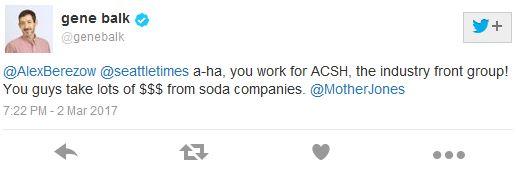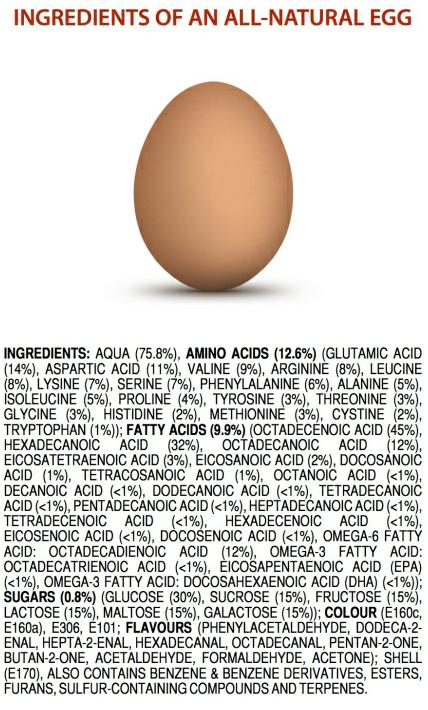
1. The anonymously-edited populist site Wikipedia allowed anti-science activists to hijack our Wikipedia page shortly after a cabal of anti-science groups issued a call to have our scientists and doctors banned from newspapers, including USA Today. Immediately not only that page began to be hacked, but also pages of individuals linked to us, obviously by the same people.
Why wouldn't Wikipedia put a stop to it? It's clearly manned by those who have a lot of time on their hands and the company would be crazy to penalize its most active users, including activists paid to undermine scientists.
Instead of Wikipedia, why wouldn't less active, pro-science people join in? Well, we didn't ask them, that would make us as unethical as Gary Ruskin, Bill McKibben and everyone else who creates real conspiracies to combat fantasy ones. Plus, our readers are too busy working and paying taxes to monkey around on Wikipedia.
2. A few days later, a writer at Seattle Times named Gene Balk used the exact same verbiage as in the organic corporation press release ("industry front group") when responding to criticisms about his claim that the lack of a tax on diet soda was racist.
You read that right, he claimed taxing sugar-sweetened soda impacted minorities most, because rich, white elites in Seattle drink diet soda, making the socioeconomic gap bigger if people who drink regular soda are taxed. Maybe, since he is a Seattle journalist, he really meant that everything should be taxed, and he just has poor command of the language he gets paid to write. Regardless of his real political goal he made it read like taxes were racist.
Naturally, Dr. Alex Berezow, also of Seattle, told him how crazy that notion was and Balk immediately showed how politically partisan he was by replying
80% of Seattle Times revenue comes from industry, including soda companies, so this seems like an odd insult to make. A few times in the past we have gotten unrestricted grants from soda companies and lazy journalists who are educated by what we in science media call "Google University" (they go to Google search, find something that confirms their bias, and declare it authoritative) think that biases scientists - yet somehow that it doesn't bias journalists. He will say journalists have a wall between them and advertisers. Just like scientists here have a wall between funding and research.
Clearly he doesn't actually know any scientists, that is why stereotypes and promoting sleazy claims about The Other come so easy to him. He's sure never going to get science from Mother Jones - which also gets 80% of its funding from industry, compared to our 4%. At least he didn't also claim that Sourcewatch and US Right To Know are his other sources, though clearly they are, since as I noted above, he used the exact same verbiage they used in their press release last week.
All that said, I am happy to take money from a soda company should they choose to send it, just like Seattle Times or Mother Jones will. Funding sources make no difference at all in our work and never will.
A good journalist would understand that.
3. In more uplifting news, journalists and farmers in Ghana are more are more accepting of science than people who get hired by Seattle Times.
As you know, we've defended the incredible, edible egg as part of a sensible diet, even when it was unfashionable. Now the public has gotten 'health fatigue' about claims the modern world is killing us, along with everything at breakfast (eggs - heart attacks; bacon - IARC cancers; toast - acrylamide; juice - Big Sugar Conspiracy; coffee - breast cancer) and have taken to asking for real science, and not just Voodoo Epidemiology.
In the world outside food scaremongering, eggs are a cheap, nutritious way to feed people, especially in the developing world. In Ghana, they are celebrating World Egg Day by standing up for real nutrition science, and cite our definitive work to do it. They even want science to make eggs even better, by discussing how eggs of the future could be even more scientifically optimized, using nutrient fortification.
But scaremongers are going to find a new approach to getting eggs banned. Like all food, eggs are chock full of chemicals. Here is what an egg would look like if it was required to have an ingredient list. Look for Seattle Times and Mother Jones to demand we have warning labels on eggs for a new reason soon.
Credit: Chemist Dr. James Kennedy of Monash.
4. Finally, in the Duluth News-Tribune, Dr. Josh Bloom outlined exactly what has led to the fentanyl crisis he brought to the national stage when we testified at the FDA's science panel on the opioid issue; policy makers rushed to demand abuse-resistant OxyContin and let activists in government claim that lazy doctors were over-prescribing opioids. Patients with legitimate needs then became addicts to less safe alternatives, which has caused far too many unnecessary deaths.
Such random government 'solve one problem to get press coverage but create two more' policy-making is why we have so many now claiming "medical" marijuana is needed for claims of pain while cancer patients who we know suffer real pain can't get actual help.
If we want to drain the regulatory swamp, we should begin by putting a stop to over-regulating pain medication for the people who everyone in medicine knows needs it.
NOTE:
Other places linking to our work:
Digital Trends, on our article about using light to kill bacteria
Baptist Press, on our concern that the March for Science was not really for science, it was instead against parts of culture one political party happens to dislike. Which looks increasingly true, given that the only science they're defending happens to match the beliefs of the political party they oppose (while not defending the science denied by their side). They have some opinions that are in defiance of settled science - we evolved, deal with it - but I appreciate the link just the same.




